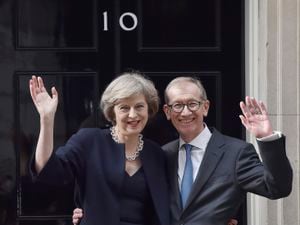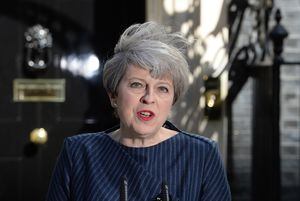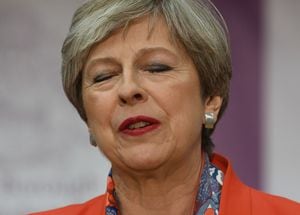Therese May's first year as Prime Minister: A long time in politics
If a week is a long time in politics, then a year must seem like a lifetime.

For Theresa May it was all going so well.
She was ushered into Downing Street unopposed after seeing Boris Johnson and Andrea Leadsom withdraw from the Conservative Party leadership race following David Cameron’s resignation after losing the EU referendum.
Her campaign had been run by the wily South Staffordshire MP Gavin Williamson who up to that point had been Cameron’s eyes and ears in parliament.
Awful or excellent? Vote in our poll:
It was one year ago today that Mrs May was appointed Prime Minister by the Queen. She gave a powerful speech about social ‘burning injustices’ on the steps of No 10.
“I know you’re working around the clock,” she said.
“I know you’re doing your best, and I know that sometimes life can be a struggle. The government I lead will be driven not by the interests of the privileged few, but by yours.”
With her reputation for steely purpose and resilience, she seemed a good choice.
She had not only survived six years as Home Secretary but flourished in a department that has the ability to kill political careers every day before breakfast.
She was also a reluctant Remainer with plenty of scepticism towards the EU to appease the Brexiteers and Remainers in the Tory ranks. “Brexit means Brexit,” she said.
As Prime Minister she lacked the polish and slick oratory performances of her predecessor, but that was seen – at the time – to be an endearing feature.
Her Cabinet appointments created a stir with Boris Johnson being named as Foreign Secretary and Liam Fox as International Trade Secretary.
Showing her mettle she made on of her first acts as PM to travel to Scotland and been the nationalist First Minister Nicola Sturgeon.

Then came the summer recess after one of the most remarkable periods in British politics.
She enjoyed an unprecedented honeymoon.
She remained unscathed as she revealed controversial plans to lift the ban on grammar schools.
Similarly, even losing in the High Court and Supreme Court to anti-Brexit campaigner Gina Miller didn’t derail her premiership.
In January she became the first world leader to meet new US President Donald Trump – a move that appalled the left prompting much hyperbole.
And she went on to win every vote on Brexit in the Commons on Brexit – again marshalled by Mr Williamson who was now her Chief Whip.
Then on March 29, she triggered Article 50 – the mechanism for leaving the European Union.
During the Easter recess, Mrs May and her husband Philip went for a walk amongst the Welsh hills.
It was here, she said, that she decided to call a snap General Election citing opposition to Brexit.
“Our opponents believe that because the Government’s majority is so small, our resolve will weaken and that they can force us to change course.
“They are wrong. They under-estimate our determination to get the job done and I am not prepared to let them endanger the security of millions of working people across the country.”

At the time, the Conservatives were 23 points ahead of Jeremy Corbyn’s Labour in the opinion polls.
She was seeking an landslip. And a short campaign would reduce any risk.
Or so she thought.
At the time, Paul Nuttall, the then-UKIP leader, remarked: “The Prime Minister seems to be enjoying the longest honeymoon in British political history. Her levels of support is like nothing we have seen since National Government territory.”
But very quickly things started to go wrong.
Mrs May – or perhaps more pertinently her two closest advisors – wanted the campaign to be focused on Brexit.
The economy – and Chancellor Philip Hammond – were sidelined.
While Jeremy Corbyn went around the country addressing large groups of students promising to scrap tuition fees and cancel debt, Mrs May’s visits tended to be high-controlled and low key affairs at businesses or addressing party members.
Her answers to questions were rehearsed, robotic and repetitive.
The Tories’ had made the entire campaign about Mrs May – having her face plastered on all literature across the country, saying she was ‘strong and stable’.
That backfired massively. The PM quickly had to U-turn on a manifesto pledge to effectively force the sick to sell their homes to plug a lack of funding for social care. The so-called Dementia Tax was a disaster for the party.
Further Tory wobbles on the pensions triple lock and tax increases meant the elderly and core vote were alienated.
Terror attacks in Manchester and London, exploited by Mr Corbyn, brought into sharp focus the cuts Mrs May had made to police numbers as Home Secretary. The party of law and order had no response.
Mr Corbyn – whose manifesto promised rainbows, gold and utopia – mopped up the youth vote and middle class public sector workers irked at austerity.
As the Tory Lichfield MP Michael Fabricant said: "Our manifesto was even more depressing than then the book of revelations."
In the biggest turnaround in recent British political history, the electorate delivered a hung parliament.
Mrs May stayed in No 10 but had to buy off the Northern Irish Democratic Unionists to the tune of £1bn to create a wafer-thin majority.
In the space of six weeks she spectacularly went from hero to zero.
And the Conservatives went from a position of strength to weakness.
Unlike Cameron, she has held her hands up for the mistakes and is determined to get on with the job.
Tory MPs have been left furious.
It is widely accepted Mrs May will not fight the next election as PM, scheduled for 2022.
Labour deputy leader Tom Watson – the West Bromwich East MP – said: "After one year – and one general election she said she wouldn't call – the Prime Minister's reputation is in tatters because the British people saw through her.
"When a Prime Minister's credibility is lost it can never be recovered. That's why Labour remains on an election footing. Theresa May is unlikely to be celebrating many more anniversaries in No 10."
For the time being the only thing that will keep her in the job for another year is the fear that a change of leadership so soon would heighten calls for another snap election, which Jeremy Corbyn could well win.
But after a year that saw Brexit, the election of President Trump, and the resurrection of JC – who can honestly predict what will happen next?





